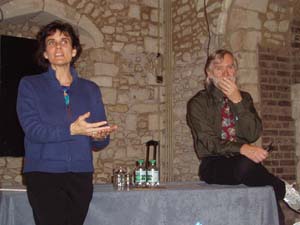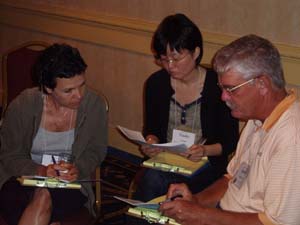Intellectual discipline is essential to the educated mind. However, we do not foster it at the expense of the emotional life of students. Rather we help students take command of their emotions, feelings and desires through the use of reason. We avoid teaching in such a way that students become overly self-critical, or obsessive about learning in order to make the grade or pass the test. We want students to experience the joy of learning, which they can best do when they take command of their learning and the development of their own intellect. Recognizing that the affective dimension of thought is just as important as the cognitive dimension, we want to foster awareness and command of both. 
Under (well-designed) instruction, emphasizing intellectual discipline, students learn how to analyze thinking, assess thinking, and re-construct thinking (improving it thereby). As a result, students so taught learn to think within the subjects they study – to think historically, anthropologically, sociologically, politically, chemically, biologically, mathematically, …
As an integral part of intellectual discipline, students learn how to read, write, speak, and listen in a new way (critically). Most importantly, they learn how to learn, using disciplined reading, writing, speaking, and listening as modalities in learning. And in the process, they take command of their own minds.
For more than a quarter century, the Foundation for Critical Thinking has emphasized and argued for the importance of teaching for critical thinking in a strong, rather than a weak, sense. We have argued for a clear and “substantive” concept of critical thinking (rather than for one that is ill-defined); for a concept:
- that interfaces well with the disciplines,
- that integrates critical with creative thinking,
- that applies directly to the needs of everyday and professional life,
- that emphasizes the affective as well as the cognitive dimension of critical thinking,
- that highlights intellectual standards and traits,
- that is essential to reasoning within every subject and domain of human thought.
A substantive concept of critical thinking does not easily reduce to a single univocal definition. Rather, it is illuminated by a range of definitions, each highlighting one of its multi-faceted dimensions: its role in intellectual analysis, evaluation, and reconstruction; its role in the array of disciplines (in historical thinking, in anthropological thinking, in sociological thinking, in artistic thinking, in scientific thinking, in the thinking of astronomers and engineers, and so forth); its role in reading, writing, and speaking; its role in investing, doing research, and self-critique; its role in transcending parochialism, egocentrism, and sociocentrism; its role in living a healthy and fit life; its role in civic life; its role in detecting media bias and propaganda; its role in non-partisan, non-ideological ethical reasoning.
 One implication of such an emphasis is this: that only through long-term planning can a substantive concept of critical thinking take roots in instruction and learning. Critical thinking cannot be taught per se in any single course, or in any short-period of time. Critical thinking is the key to educational reform and deep learning, but not in any simplistic form and not in any short-term strategy. We need short-term strategies, of course. But without long-term planning nothing substantial occurs; deep learning does not result.
One implication of such an emphasis is this: that only through long-term planning can a substantive concept of critical thinking take roots in instruction and learning. Critical thinking cannot be taught per se in any single course, or in any short-period of time. Critical thinking is the key to educational reform and deep learning, but not in any simplistic form and not in any short-term strategy. We need short-term strategies, of course. But without long-term planning nothing substantial occurs; deep learning does not result.
The conference will enable participants to design instruction so that students:
- Study subjects at a deeper level and from a greater variety of standpoints
- Acquire the spirit of critical enquiry
- Develop perspective across a wide variety of subjects
- Raise and discuss fundamental questions
- Weigh and assess evidence and reasoning in coming to their own conclusions
- Use and interpret relevant documents
- Relate specialized knowledge to more general issues and inquiry
- Ground their thought in relevant examples
- Discuss broad issues from a multi-disciplinary perspective
Click to download the printable 2009 Conference Flyer (2.3MB Acrobat PDF File)
{"id":2557,"title":"","author":"","content":"<p>Intellectual discipline is essential to the educated mind.&nbsp; <em>However, we do not foster it at the expense of the emotional life of students.&nbsp;</em> Rather we help students take command of their emotions, feelings and desires through the use of reason. We avoid teaching in such a way that students become overly self-critical, or obsessive about learning in order to make the grade or pass the test.&nbsp; We want students to experience the joy of learning, which they can best do when they take command of their learning and the development of their own intellect. Recognizing that the affective dimension of thought is just as important as the cognitive dimension, we want to foster awareness and command of both. <img src=\"https://www.criticalthinking.org/image/pimage/P1010063.jpg\" border=\"0\" alt=\"\" hspace=\"10\" vspace=\"5\" align=\"right\" /><br /> Under (well-designed) instruction, emphasizing intellectual discipline, students learn how to analyze thinking, assess thinking, and re-construct thinking (improving it thereby). As a result, students so taught learn to think within the subjects they study &ndash; to think historically, anthropologically, sociologically, politically, chemically, biologically, mathematically, &hellip; <br /> <br /> As an integral part of intellectual discipline, students learn how to read, write, speak, and listen in a new way (critically). Most importantly, they learn how to learn, using disciplined reading, writing, speaking, and listening as modalities in learning. And in the process, they take command of their own minds.<br /> <br /> For more than a quarter century, the Foundation for Critical Thinking has emphasized and argued for the importance of teaching for critical thinking in a strong, rather than a weak, sense. We have argued for a clear and &ldquo;substantive&rdquo; concept of critical thinking (rather than for one that is ill-defined); for a concept:</p>\r\n<ol>\r\n<li>that interfaces well with the disciplines,</li>\r\n<li>that integrates critical with creative thinking,</li>\r\n<li>that applies directly to the needs of everyday and professional life,</li>\r\n<li>that emphasizes the affective as well as the cognitive dimension of critical thinking,</li>\r\n<li>that highlights intellectual standards and traits,</li>\r\n<li>that is essential to reasoning within every subject and domain of human thought.</li>\r\n</ol>\r\n<p><br /> A substantive concept of critical thinking does not easily reduce to a single univocal definition. Rather, it is illuminated by a range of definitions, each highlighting one of its multi-faceted dimensions: its role in intellectual analysis, evaluation, and reconstruction; its role in the array of disciplines (in historical thinking, in anthropological thinking, in sociological thinking, in artistic thinking, in scientific thinking, in the thinking of astronomers and engineers, and so forth); its role in reading, writing, and speaking; its role in investing, doing research, and self-critique; its role in transcending parochialism, egocentrism, and sociocentrism; its role in living a healthy and fit life; its role in civic life; its role in detecting media bias and propaganda; its role in non-partisan, non-ideological ethical reasoning. <br /> <br /> <img src=\"https://www.criticalthinking.org/image/pimage/P1010120.jpg\" border=\"0\" alt=\"\" hspace=\"10\" vspace=\"5\" align=\"right\" />One implication of such an emphasis is this: that only through long-term planning can a substantive concept of critical thinking take roots in instruction and learning. Critical thinking cannot be taught per se in any single course, or in any short-period of time. Critical thinking is the key to educational reform and deep learning, but not in any simplistic form and not in any short-term strategy. We need short-term strategies, of course. But without long-term planning nothing substantial occurs; deep learning does not result. <br /> <br /> The conference will enable participants to design instruction so that students:</p>\r\n<ul>\r\n<li>Study subjects at a deeper level and from a greater variety of standpoints</li>\r\n<li>Acquire the spirit of critical enquiry</li>\r\n<li>Develop perspective across a wide variety of subjects</li>\r\n<li>Raise and discuss fundamental questions</li>\r\n<li>Weigh and assess evidence and reasoning in coming to their own conclusions</li>\r\n<li>Use and interpret relevant documents</li>\r\n<li>Relate specialized knowledge to more general issues and inquiry</li>\r\n<li>Ground their thought in relevant examples</li>\r\n<li>Discuss broad issues from a multi-disciplinary perspective</li>\r\n</ul>\r\n<p><a style=\"font-weight: bold;\" href=\"/files/2009_Intl_Conf_flyer_web.pdf\" target=\"_blank\">Click to download the printable 2009 Conference Flyer (2.3MB Acrobat PDF File)</a></p>\r\n<p><br style=\"clear: both;\" /></p>","public_access":"1","public_downloads":"1","sku":"","files":{},"images":{}}

 One implication of such an emphasis is this: that only through long-term planning can a substantive concept of critical thinking take roots in instruction and learning. Critical thinking cannot be taught per se in any single course, or in any short-period of time. Critical thinking is the key to educational reform and deep learning, but not in any simplistic form and not in any short-term strategy. We need short-term strategies, of course. But without long-term planning nothing substantial occurs; deep learning does not result.
One implication of such an emphasis is this: that only through long-term planning can a substantive concept of critical thinking take roots in instruction and learning. Critical thinking cannot be taught per se in any single course, or in any short-period of time. Critical thinking is the key to educational reform and deep learning, but not in any simplistic form and not in any short-term strategy. We need short-term strategies, of course. But without long-term planning nothing substantial occurs; deep learning does not result.